Marsin Alshamary breaks down the electorate and the political factions competing in Iraq’s upcoming October parliamentary elections. This piece was originally published in 1001 Iraqi Thoughts.
To understand the likely and unlikely outcomes of Iraq’s early parliamentary elections, scheduled for October, we need to understand both who is running and who is voting. Although these early elections were an answer to the demands of the October 2019 protest movement, they are likely to be boycotted by the same activists who demanded them due to an inhospitable pre-electoral environment. The impact of the boycotts will be tempered by the formal and informal coalitions being formed among established political parties but will likely result in outcomes similar to the previous elections in 2018.
Among the established party leaders in Iraq, only former Prime Minister Haider al-Abadi and Ammar al-Hakim have formally formed a coalition, the Power of the National State Coalition. Al-Hakim, who is both a cleric and a politician, formerly headed the Islamic Supreme Council of Iraq before breaking away from it to establish the National Wisdom Movement (al-Hikma), claiming to be a “civic” rather than Islamist party.
The informal coalitions, expected to form post-hoc, are between Muqtada al-Sadr’s movement and Massoud Barzani’s Kurdistan Democratic Party (KDP) and between Hadi al-Ameri’s Fateh coalition and the Patriotic Union of Kurdistan (PUK), co-led by Lahur and Bafel Talabani. While the former may style themselves as the anti-Iran coalition, both al-Sadr and the Barzanis enjoy close ties to Iran. Al-Sadr is a populist cleric with a cult-like following and a reputation for being politically inconsistent. In Iraq’s 2018 elections, his Sairoon alliance won the most seats, largely due to low voter turnout as a result of the boycott movement. Mohammed al-Halbousi, the current speaker of parliament, is expected to align with them. Such a coalition would be disastrous for the already waning freedom of speech in Iraq, as both the Sadrists and the KDP have been known to curtail freedoms.
For these established parties and big-name politicians, Iraq’s new and smaller electoral districts — a demand of the 2019 protests — means that they are less inclined to run many candidates, but rather to focus on the districts in which they can win. This has resulted in a precipitous drop in the number of candidates registered from 7,178 candidates in 2018 down to 3,532 parties in 2021. The ability to win at the provincial level, but not district level, will deter some party leaders from running for office. Though this is a positive development, it comes with repercussions including the fear amongst activists that they are easier to target when running in smaller communities.
Indeed, Iraq’s current security environment presents one of the greatest obstacles to political participation. Since the end of the October 2019 protest movement, violence against activists has gone from indiscriminate killings to targeted assassinations. One of the key unmet demands of the protest movement has been justice for killed protestors and activists. Prime Minister Mustafa al-Kadhimi’s failure to provide justice triggered nation-wide protests under the slogan of “Who Killed Me?” The death of Kerbala-based activist, Ihab al-Wazni inspired many of Iraq’s new protest political parties to declare a boycott of the elections. Conceivably, these aspiring politicians may fear a Mexico-like situation, where candidates are killed ahead of elections with impunity.
The Iraqi Communist Party (ICP) has joined the ranks of the boycotters, despite running alongside the Sadrists in the 2018 elections. In an article, the head of the ICP has explained that the elections are being boycotted to strip the government of legitimacy. He writes that the scheduled elections do not reflect the demands of the protestors, particularly not the legal changes required, nor the appropriate security environment, nor the independence of the electoral commission. Many of the protest-based parties agreed with his argument, though some are still debating the merits of boycott and considering running for office.
Protest by parties must be distinguished from public boycott. Of course, protest-based parties and elite activists have a role to play in setting public discourse, but they are not the only molders of public opinion. A key player is Grand Ayatollah Ali al-Sistani, who may issue a statement on the elections that may encourage people to vote (as in 2005) or may leave the choice to them and thereby create space for boycott (as in 2018). It will take extreme public unrest for al-Sistani to issue such a statement and he will do it while balancing his own credibility with his dedication to protecting the existing legal and constitutional mechanisms. In addition to al-Sistani, the United Nations has unexpectedly agreed to the Iraqi government’s request for further electoral assistance by providing election-day monitoring. They have expressed their intention to communicate their role with the Iraqi public, which is crucial as many activists have expressed a demand for international oversight to ensure electoral integrity.
In a scenario where the public and protest-parties both boycott, the likely outcome is a division between the two major Shia parties — the Sadrists and Fateh — and their respective Kurdish party allies. This will lead to familiar negotiations on a compromise candidate as prime minister, which can result in either a weak independent (like Adil Abd al-Mahdi or Mustafa al-Kadhimi) or a politically-backed one who is viewed as being too implicated in the political order. The presidency, as it often has, will likely go to the PUK whose co-president has recently announced his support for the reelection of President Barham Salih, arguably the candidate with the most political leverage in Baghdad. Despite al-Halbousi’s expected electoral success in a district in Anbar, no speaker of parliament has had more than a term and his predecessor, Salim al-Jibouri, was not even able to hold his seat in parliament after.
If there are no boycotts, the pieces of the pie for these established parties will be smaller and the negotiations for the premiership may take longer. The results, unfortunately, will not likely be different for the three high offices. Where things will change will be in parliament, where new parties may be able to negotiate more. But the most we can hope for in such a scenario is incremental change, over years, through parliament.
Until then, there is always the chance of protests in Iraq. So long as old underlying grievances (poor service, unemployment, corruption) and new grievances (no justice for the killed and a decline in freedom of speech) exist, any match may ignite protests.
The Brookings Institution is committed to quality, independence, and impact.
We are supported by a diverse array of funders. In line with our values and policies, each Brookings publication represents the sole views of its author(s).

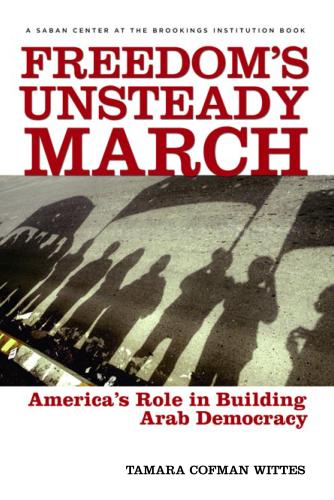
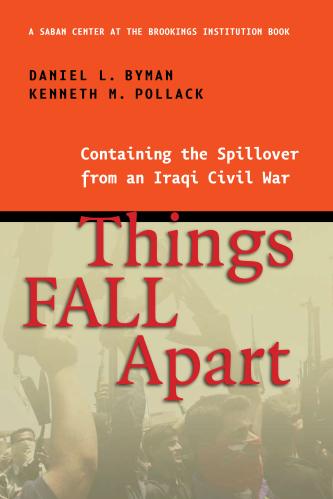
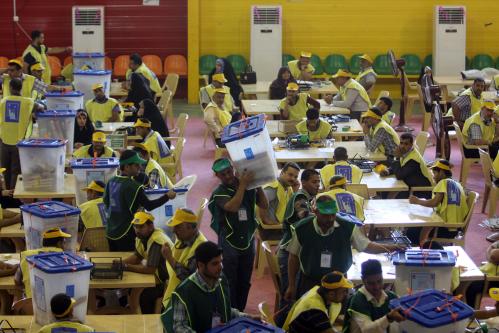
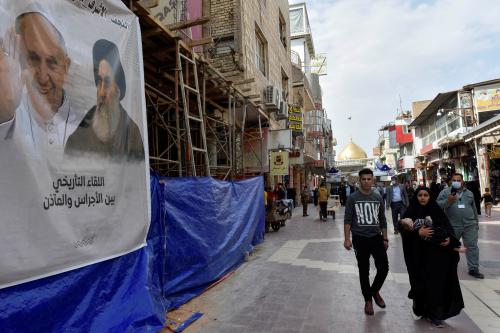
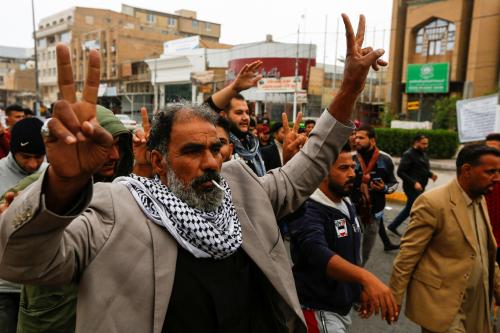
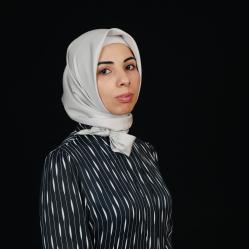
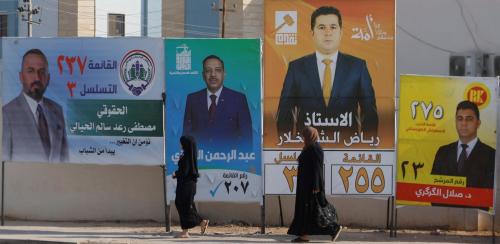
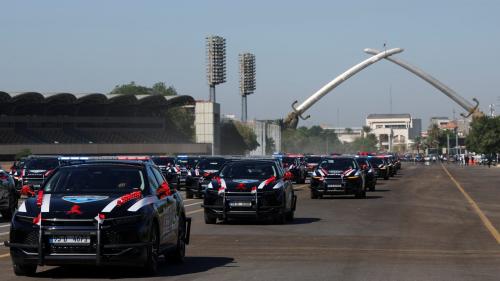

Commentary
Iraq’s upcoming elections: Voters and likely winners
June 24, 2021